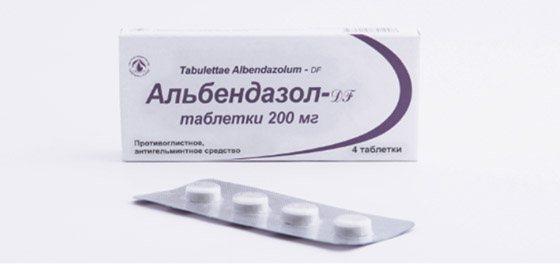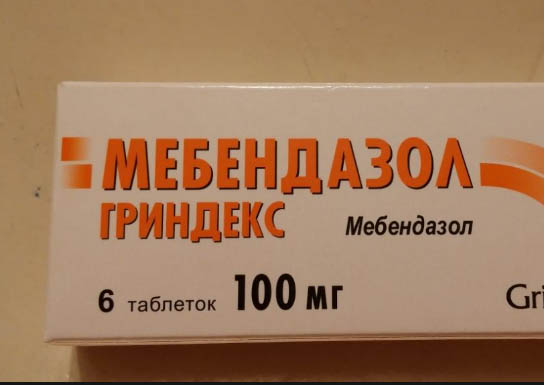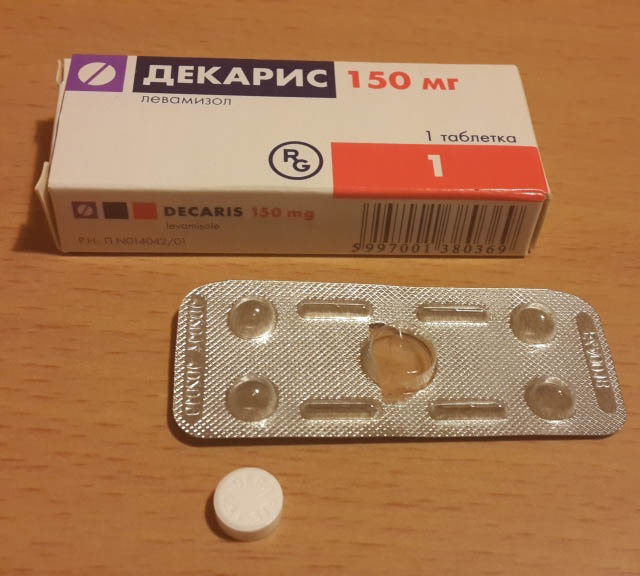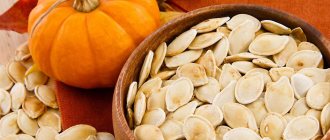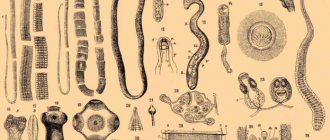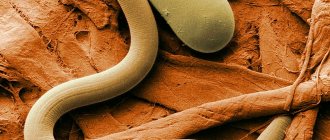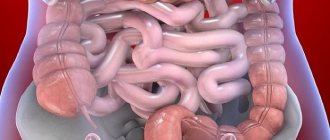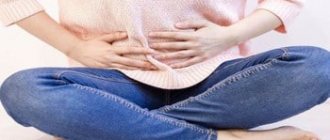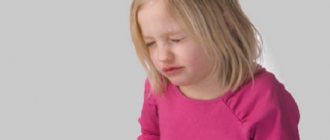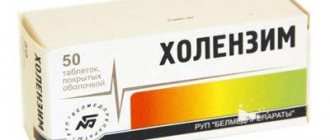Any parasites that live in the human body cause parasitic destruction and diseases. These can range from stomach ulcers and hepatitis to cancerous tumors. Worms are more dangerous in children two years old. At this age, the child’s defenses are just being formed and his body is not able to repel these “uninvited guests.” The most common types of helminths in children are roundworms, dwarf tapeworms, trichinella, pinworms and whipworms. Depending on their type, there are both general and distinctive signs of worms in a 2-year-old child.
Causes
There are many reasons leading to helminthiasis in children. It is necessary to highlight the most common reasons, which include:
- Failure to comply with the rules for processing and preparing vegetables, fruits and meat products (consumption of dirty vegetables and fruits, incompletely cooked meat containing helminth larvae).
- Drinking water from reservoirs containing helminth larvae (children can accidentally swallow such water while bathing).
- Penetration of helminth larvae through the bite of blood-sucking insects (there are such cases, but quite rarely).
- The presence of pets in the family and the child’s close contact with them (the child picks up cats or dogs and then puts unwashed hands in his mouth).
- When the family does not instill in the child hygiene skills (washing hands after playing outside, especially in the sand; after visiting public places, including toilets).
- Lack of hygienic care for the child (regular bathing, changing both bed and underwear and mandatory ironing, as well as cutting nails).
- Bad habits (little children love to bite their nails and taste everything).
- Intrauterine infection from the mother (penetration of helminths through the fetoplacental barrier from the bloodstream).
- Children's groups (therefore, if a child has been absent from the kindergarten for more than one month, a mandatory condition for his return to the group is to examine the stool for the presence of helminth eggs).
- Decreased child immunity.
- The presence of helminthiases in one of the family members (if the hygienic rules for using individual items - towels, soap and other means - are not followed).
Symptoms of the presence of worms in children 3 years old
Quite often it happens that the child’s body already has worms, but they do not show any signs. This is the main goal of the worm - to exist in the human body unnoticed for as long as possible. Symptoms of the presence of worms in children aged 3 years are clearly expressed only when there are a lot of them in the body. A large number of them are formed when they either lived in the body unnoticed for a fairly long period of time, or if the child has very low immunity and suffers from diseases that contribute to the development of parasites in the body. There are also cases when quite rare types of worms have appeared in the body, which can cause strong reactions in the body.
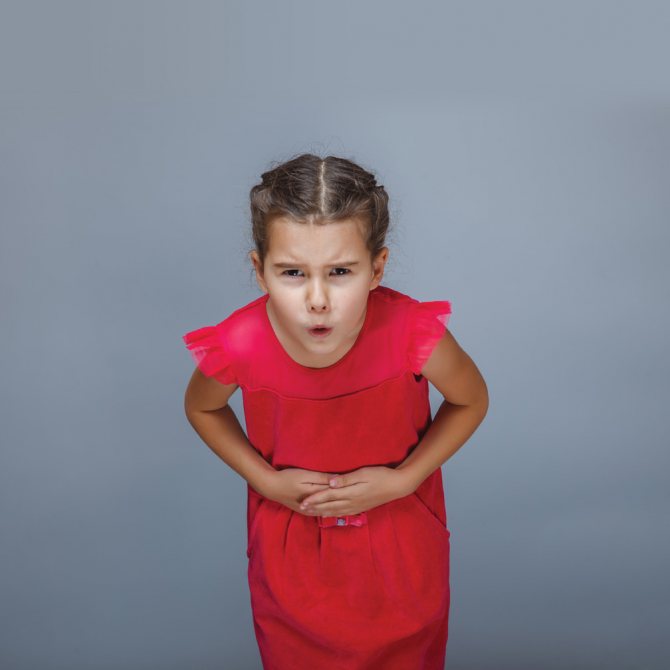
Signs
There are several common first signs of worms in children, by which you can try to understand whether there are parasites in the baby’s body:
- his appetite has greatly increased compared to what it was before, and in addition to this, his total body weight began to increase;
- increased salivation;
- the intestines began to be in a depressed state, this is expressed in flatulence, irregular bowel movements, nausea, pain in the stomach or hypochondrium, and intestinal spasms are also possible;
- the child began to complain of frequent headaches and dizziness, and began to get tired faster;
- allergy symptoms appeared that had never existed before, and existing allergies began to manifest themselves in the most severe forms;
- the child became easily irritated, his sleep became poor, his level of attention decreased, slight memory lapses also indicate that intoxication is occurring in the body;
- the hair became very brittle and began to fall out profusely, the nails lost their strength and began to peel, this indicates that vitamin deficiency and iron deficiency have occurred in the body;
- Inflammatory processes in the nasopharyngeal area often occur, this can be sinusitis or sinusitis, inflammatory processes in the genital organs, this especially applies to girls, since their anus and vagina are very close to each other.
If worms are in the body for quite a long time, then in the future there will be signs and symptoms of worms in children 3 years old, such as developmental delays, growth and weight will be less than expected, and disruptions in the functioning of the gastrointestinal tract will be observed. Anemia, allergies and other diseases can be observed, and nervous system disorders can also be observed. Most often, worms begin to make themselves known in a period of time from 2 to 4 weeks after entering the child’s body. Symptoms will depend on what kind of parasite is infested, in what quantities and also on the general health of the child.
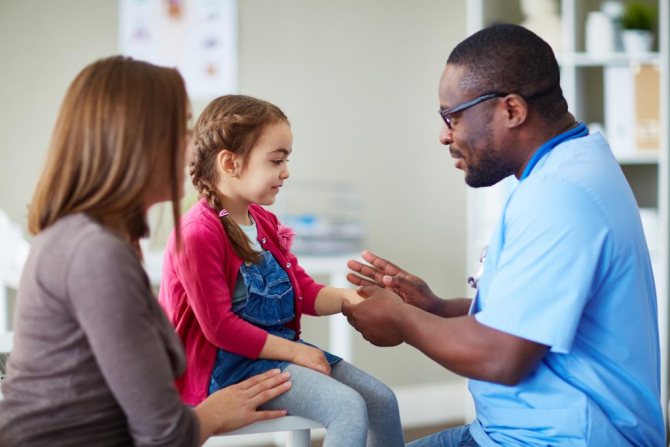
Symptoms
All types of worms have common symptoms, including:
- Allergy. The helminth releases toxic substances into the baby's organs. A rash and swelling of the skin appears. Due to the high degree of infection, body temperature rises, headaches, nervous tension, sleep disorders and severe fatigue occur. Diarrhea appears or, conversely, constipation, flatulence and vomiting.
- Weight loss. During the period of illness, the child’s body lacks nutrients. Because of this, his appetite increases. He eats more, but does not gain weight. Food is not absorbed by the child, but by foreign organisms.
- Increased salivation.
- Other manifestations. Worms reduce immunity, thereby provoking the development of sinusitis, sinusitis, and nasopharyngeal diseases. Sometimes diseases of the genital organs, anemia and hymenolepiasis (a pathology arising from the dwarf tapeworm) occur.
Specific manifestations
Specific signs of helminths in children depend on the parasite itself. For example, roundworms, penetrating the intestines, then move to the lungs, and then return with sputum to the digestive system. At the same time, they affect the respiratory tract, and the child begins to cough with sputum.
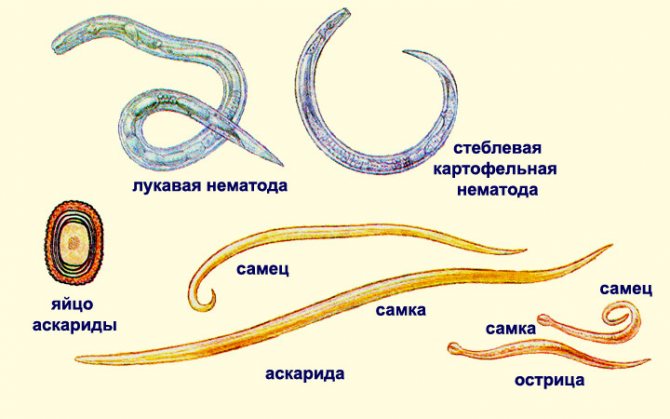
Another specific symptom is itching and redness in the anus. It occurs due to the development of enterobiasis. Pinworms lay eggs in folds, irritating the skin.
The appearance of whipworm (trichocephalosis) in a child’s body can occur without symptoms for a long time. This occurs with a small infestation (less than 100 worms). When their number increases, signs appear in the gastrointestinal tract, and the baby’s nervous system is also affected.
Diagnostics
In most situations, worms are diagnosed during an annual preventative stool examination for worm eggs. But this is not a very reliable method: in the presence of symptoms and a negative analysis, it should be borne in mind that not all types of helminths can be determined in this way. Species that lay eggs may also avoid detection in this type of diagnosis, since the cyclicity of reproduction may not correspond to the period of analysis. There are also cases where the body contains one or more same-sex individuals that cannot reproduce, but can cause harm throughout their life cycle.
In case of negative stool tests, a secondary examination is recommended after 2-3 weeks. The list of preventive tests includes analysis for the presence of worm eggs and scraping for enterobiasis. The presence of helminths can also be suspected based on the results of blood tests: a high level of eosinophils in combination with low hemoglobin in most situations indicates the presence of parasites in the body.
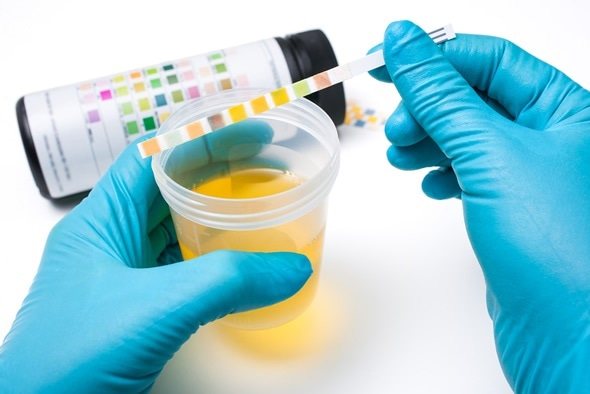
Additional Methods
There are other methods for identifying symptoms of worms in children 3 years old. To clarify the diagnosis, tests of sputum, bile, urine, and stool coprogram can be used. To clarify the diagnosis, if echinococcus is suspected, the peritoneal organs are examined using sound and/or x-ray methods. The disease is diagnosed using analyzes of the intestinal tract and duodenal intubation. Immunological studies can help clarify the type of parasite and the harm it causes to the body. After an accurate diagnosis, a method of treating worms in a child and the best methods of combating them are selected.
"Vermox"
In recent years, the number of effective deworming agents has decreased, which is due to the increase in drug resistance of pathogens and improper self-medication. The drug Vermox (mebendazole) is widely used, including in pediatric practice. Advantages of the drug for eliminating signs of worms in children 2-3 years old and eliminating the disease in general:
- High therapeutic activity against the pathogen.
- A fairly wide range of anthelmintic activity (enterobiasis, trichuriasis, ascariasis, taeniasis and many other pathogens).
- Low toxicity of the drug.
- The mechanism of action, which manifests itself in eliminating the ability of helminths to absorb glucose, as the main source of their energy and nutrition.
- High activity against helminth eggs (ovicidal activity).
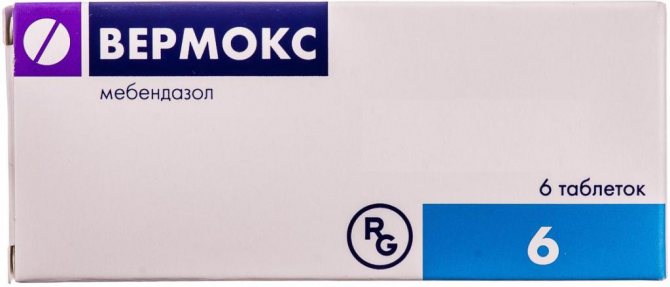
Disadvantages of the drug:
- treatment of children from the age of 2 years (by the decision of a specialist and the presence of indications, use in children less than 2 years old is possible);
- allergic reactions (here it is necessary to differentiate whether this is a reaction to the drug itself and its components, or to toxic substances released after the death of a huge number of helminths).
Important: if a pathogen is isolated from a child’s stool, then each family member (including animals, if any) must be treated.
Medicines in the form of tablets for worms for children 2 years old
Faced with the problem of worm infection, many parents begin to select their own medications.
This is strictly prohibited! The required dosage, duration of treatment, the drug is prescribed individually by the doctor after determining the type of worms that have affected the baby’s body.
In each individual case, the doctor takes into account possible side effects and contraindications. This will protect the child from negative consequences and provide the desired effect of getting rid of parasites.
| Drug name | Dosage form | Spectrum of action |
| Albendazole
| pills | Used to treat mixed forms of parasitic infestation. Aggressively affects helminths. They have side effects from the intestines. Individually, they can provoke stomatitis and urticaria. The dosage is individually prescribed by the doctor. |
| Mebendazole
| pills | Prescribed for all types of helminthic infestations. The dosage and duration of treatment are determined individually. The drug can cause allergic reactions and fever. Liver dysfunction and anemia are rarely observed. |
| Dekaris
| pills | The drug is prescribed for the treatment of roundworms, pinworms, and nematodes. The dosage is determined separately in each case. The drug may cause nausea, diarrhea, cramps, and skin rashes. Problems with the functioning of the liver and kidneys rarely occur. |
The specialist may prescribe the combined use of several drugs. It all depends on the severity of the helminthic infestation. The dosage of medications may change during the course of treatment. After completion of therapy, repeated tests are scheduled.
It is strictly prohibited to discontinue medications on your own, increase or decrease the dosage. This can cause side effects and lead to a deterioration in health.
"Pirantel"
The drug “Pyrantel” is popular among pediatricians for eliminating the disease and symptoms of worms in a 3-year-old child. It blocks the nervous system of helminths and promotes their removal from the body. Advantages of this medicine:
- convenient release form for children (in the form of a suspension);
- pleasant taste (flavor of fruit, which does not cause negative emotions in the child);
- affordable price category of the drug.
"Pyrantel" in suspension can be used in children from 6 months of age to eliminate the disease and symptoms of worms in a 3-year-old child.
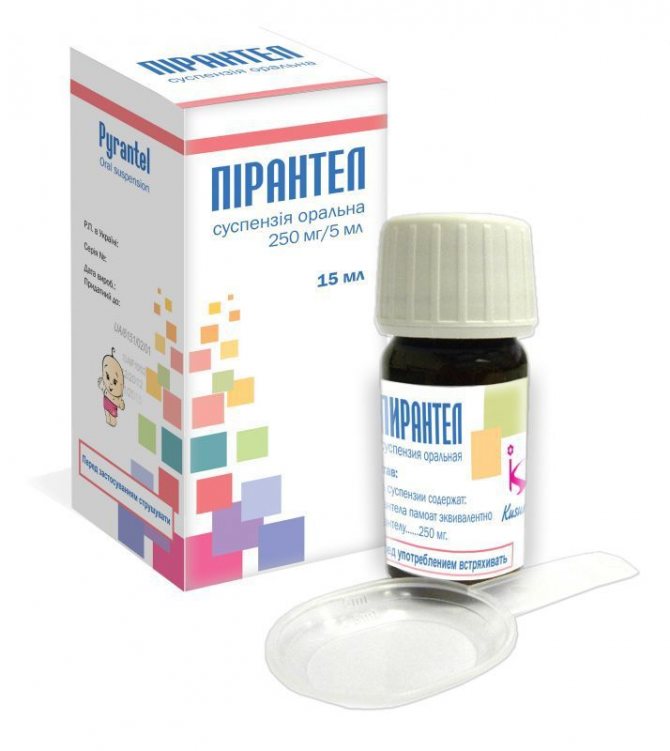
For the treatment of enterobiasis: calculation for children: 10 mg/kg once a day. Treatment of ascariasis: 5 mg/kg once daily.
Alternative regimens for etiotropic treatment of helminthiasis may include the following drugs: Albendazole (children over 2 years old), Levamisole, Ivermectin (children over 5 years old). Symptomatic therapy includes restoration of normal intestinal microflora, for this purpose the following drugs are used: Bifikol, Bifidumbacterin, Linex, Acipol and others. A month after the end of the course of treatment, it is necessary to determine whether it was effective or not. To do this, a laboratory test is performed on a stool sample. If helminth eggs are found in the feces, this is an indication for a second course of treatment. But if nothing is found in the stool, then samples are taken again at intervals of 2 days and the result is assessed again. If it is negative, then treatment is stopped. Children should undergo preventive deworming twice a year.
Prevention of helminthiases
In order to protect your baby from infection with worms, parents must follow these rules:
- Carry out daily wet cleaning in the room where the baby is;
- Before feeding your baby, you need to thoroughly wash your hands and your baby’s hands with soap;
- It is not recommended to have a pet in a home where a small child is growing up;
- When walking with your baby, you should carefully watch so that the child does not put anything in his mouth;
- Once a year it is recommended to carry out drug prevention of worms in all family members;
- The nails on the baby’s arms and legs should be trimmed regularly;
- Clothes, shoes, dishes and other children's household items must be kept clean.
Compliance with each recommendation will allow parents to protect their child from infection with intestinal parasites.
If mom or dad suspects alarming symptoms in the baby, then the solution to this issue should be entrusted to a medical specialist. Subscribe to our VKontakte group
Traditional treatment
Often, to treat a child for worms, medications are used that are based exclusively on herbal ingredients; these can be a variety of oils, juices, infusions and decoctions. They may differ in taste, so if the product is quite bitter, it is better not to give it to a very young child; it is especially not recommended to treat children under 6 years of age with them. If the medicine has a bitter taste, this may indicate that if too much is taken, it may pose a danger to life or health, due to the fact that among their components are alkaloids, which have dangerous toxic properties.
- Treatment with garlic. Garlic belongs to the onion family, and it is quite in demand in folk therapy. Garlic removes pathogenic elements from the body, including helminths. Children need to take it for treatment in forms such as decoction, infusion or as an enema. It is better to prepare garlic broth with milk based on the proportions of three cloves per glass. First, you need to heat the milk so that it is hot, pour in the garlic and continue to cook for 20 minutes. Next, the resulting broth needs to be cooled and then strained. When used, this folk remedy does not give a distinct garlic taste, so it can be given to even the smallest children. For the medicine to work, you need to take it at least one glass per day, for at least 5 days. This garlic infusion can also be used as an enema before bedtime. Garlic will be especially effective in this preparation against pinworms. You can also prepare a garlic infusion. To do this, you need to take two cloves of garlic, chop them well and pour a glass of boiling water. After 30 minutes, the infusion is completely ready for use. In order to make the taste softer, you can add a little lemon juice and honey to the infusion. Take only warm, as a cold infusion loses its healing properties. It would be right to add a little garlic to all the dishes you eat, be it soup or salad. Finely chopped garlic can be added to applesauce or honey so that children don’t even feel it. Raw garlic is considered the most effective against worms. In general, the optimal number of garlic cloves to eat is 6, naturally, if the child’s age allows it. This is considered the best method for controlling tapeworms. Garlic can also be used externally. The garlic must be finely chopped and rubbed into the heels, which must first be moistened in vegetable oil.
- Treatment with vegetable oils. Such products can be used either individually or in combination with other procedures and means. One of the most ancient, popular and effective folk methods of treatment against worms is to lubricate a cotton pad in vegetable oil, rub it over the anus and go to bed. The course of such therapy should last no less than a month. An effective remedy would be vegetable oil mixed with Vaseline. The resulting mixture should be lubricated from the outside of the anus, this is done so that the helminths cannot lay eggs. The course lasts at least two months.
Parents need to pay attention to the prevention of worms in children 2-3 years old. This primarily includes proper nutrition and hygiene measures.
Preparations in the form of syrup and suspension
Suspensions and syrups are often prescribed during treatment for worms, since they are easier for the child to consume. Among other drugs, Pirantel can be called less toxic. The medicine guarantees a mild effect, a gentle effect.
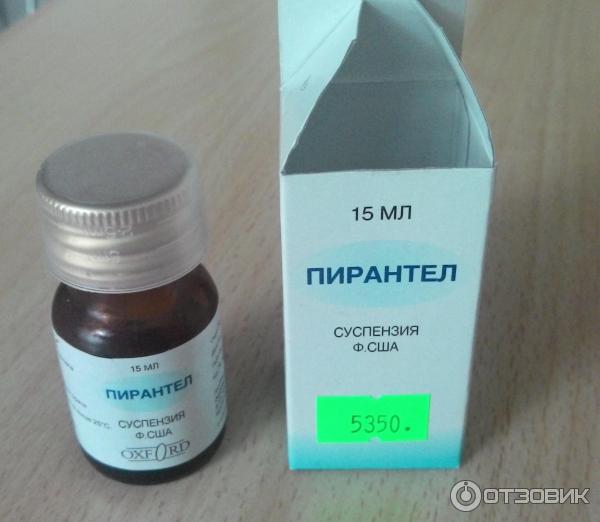
Suspensions effectively fight against roundworms. The active components of the drug, entering the body, disrupt the functioning of the neuromuscular system of worms. They lose the ability to move and pass out together with the feces.
The advantage is that the parasites do not die inside the body, poisoning it with decay products. Pyrantel can be used not only for treatment, but also for prevention, but this can only be prescribed by the attending physician.
Plant-based syrup against worms - Helmonet. The advantage of the drug is not only its destructive effect on parasites, but also its ability to restore normal intestinal microflora. The drug consists of:
- walnut extract;
- pumpkin seeds;
- fennel fruit;
- prunes;
- thyme;
- dried apricots.
Helmonet helps get rid of lamblia and roundworms. It is prescribed for therapeutic and preventive purposes.
